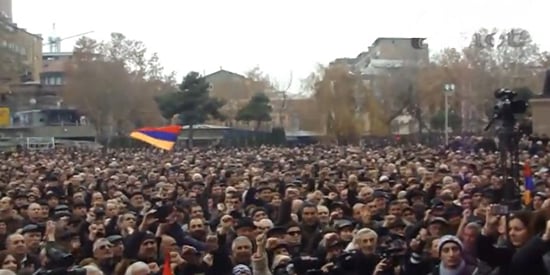Armenian PM's resignation could end one party rule: Deakin expert
Media releaseThe Armenian Prime Minister’s resignation is a sign that the nation’s people are trying to prevent a slide into a Putin-style one party state, according to a Deakin University international relations expert.
Dr James Barry is a researcher with the University’s Alfred Deakin Institute for Citizenship and Globalisation and has studied Armenian identity in Armenia and the Armenian diaspora.
He said Serzh Sargsyan’s resignation in response to protests against him taking on the role of prime minister could mark a move away from the longstanding influence of the dominant party that had supported a ‘mafia state’ similar to that in Russia.
“The prime minister’s resignation is significant since the same clique of politicians has dominated Armenian politics since the end of the Soviet Era in the late 1980s and has marginalised most other political voices,” Dr Barry said.
“I think that while local voices are important, ultimately the government is worried about the political and economic influence of the Armenian diaspora on this one.
“The diaspora of Armenians who are strong in the Middle East, United States and Western Europe have been leading a lot of the campaign against Sargsyan.
“One of his main opponents in Armenia was raised in Lebanon, and although most of the protesters are ‘Hayastantsis’ (Armenians from Armenia), diaspora Armenians have been using social media to get their voices heard among non-Armenians around the world.
“There is a great amount of disappointment for the Armenian government in the diaspora – even people in Australia have been pressuring the various Armenian organisations here to issue statements in favour of the protesters.”
Dr Barry said that the political uncertainty in Armenia could exacerbate the looming threat of Russian and Azerbaijan over Karabakh, an ethnic enclave that moved to Armenia from Azerbaijan and declared independence after war between the two former Soviet states. Karabakh is not recognised by any country, including Armenia.
“The biggest threats are Russia and Azerbaijan,” he said.
“Putin does not like “velvet” or “orange” revolutions, and would be worried about what is happening in Armenia. He has punished both Georgia and Ukraine in the past for moving out of the Russian orbit.
“The fear is that Azerbaijan will see this uncertainty as a green light to attack Armenia (or Karabakh) again, as they did in 2016, and it is highly likely that Russia would quietly give the ok for this.”
Share this story

